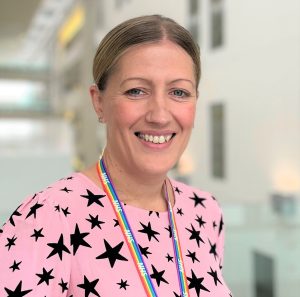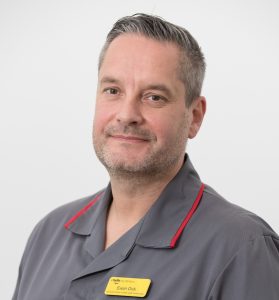Specialist paediatric dietitian Paige Alsop has been awarded Newcastle’s first Researcher Development Institute Embedded Researcher Fellowship.
Paige specialises in the nutritional needs of children and young people with cystic fibrosis at Newcastle’s Great North Children’s Hospital.
Since the introduction of the world’s first ever triple combination therapy in 2020, she and colleagues have found themselves in an exciting new era of cystic fibrosis care – the ‘modulator era’ leading to transformative improvements for patients such as the reduced use of symptomatic medications and improved lung and gastrointestinal function.
Whilst fantastic news and lifechanging for our young patients and their families it is important that the model of care used adapts with these changes without any negative impact on patient care and outcomes.
Embedded Researcher Fellowship
Paige’s Fellowship enables her to be the Embedded Researcher in Newcastle’s children’s cystic fibrosis team, working collaborating to understand the short and long term implications of this new treatment and how best to respond with currently unavailable clinical guidance.
The research aims to ensure they can adapt to rapidly emerging treatment and disease presentation changes, contributing to the continuation of outstanding patient care.

Paige will work alongside her clinical and academic colleagues to co-design and lead on their jointly agreed research supported by a full-time academic programme at doctoral level at Northumbria University.
Funded by the Newcastle Hospitals Charity, this innovative Fellowship is a collaboration between the Newcastle Hospitals, The James Paget University Hospitals and the ImpACT Research Group at University of East Anglia which aims to contribute to the range of work going on to support research capacity building for the NMAHP workforce.
Rapidly responding to the unknown
“Cystic fibrosis is an inherited life limiting, multi-system disease which has no cure,” explains Paige.
“Thankfully, through advancements in treatment and therapies, we have seen significant improvements in life expectancy over the years. So much so that since the introduction of the world’s first ever triple combination therapy in 2020, we actually find ourselves in a new clinical landscape.
“In Newcastle we are observing considerable changes in patient outcomes which is exciting and promising for the future, yet we don’t really know what this means for our patients in the long term and our approach to their care has become new and unfamiliar.
“Through this Embedded Researcher Fellowship, we aim to advance our knowledge and quantify the impact of these modulators for our patients.”
Paige continues “For example, at present there is limited evidence-based literature to form clear, up to date guidelines on the most appropriate approach to the management of cystic fibrosis and associated interventions.
“We intend to initiate change by conducting research to gather the data needed to shape current, best practice to underpin the delivery of high quality patient care.”
The team’s research has the potential to lead to reduced treatment burden for children and their families, alleviating psychological impact and improving quality of life.
“As a regional service led by a hugely experienced, specialist multidisciplinary team, we are perfectly placed to be at the forefront, pioneering innovative research,” adds Paige.
As for her own academic clinical career Paige says “This is a time of having to get comfortable being uncomfortable. I think this goes without saying for both moving into a new era of cystic fibrosis care and piloting this embedded researcher fellowship.
“There are lots of unknowns over the next five years, but also huge potential for growth and improvement – which makes it really exciting to be a part of this research journey.”
Supporting our NMAHPs at every stage of their research journey

Of Paige’s Fellowship Dr Linda Tinkler, Trust Lead for NMAHPs Research at Newcastle Hospitals said: “I am absolutely delighted that Paige and her wider MDT have been awarded our first ever practice led embedded researcher fellowship.
This pilot fellowship was developed from the seed of an idea during early morning car commute conversations with a colleague in the East of England. The idea has since been allowed to grow into the real pilot fellowship we have launched due to the support of our Trust charity through the wider Researcher Development Institute award.
“Paige has demonstrated clear commitment to developing a clinical academic career and has been engaging with the resources provided by the NMAHP research team for some time.
During this time she has accessed 1-1 research clinics, attended YES! Research Support Groups and completed the NMAHP 4Ps Researcher Development Programme. Paige’s manager Eleanor has been a fantastic support to Paige, also engaging with the support provided by the NMAHP Research Team. This is a key recipe for success in developing and supporting vibrant research active cultures within clinical teams.”
Linda adds: “I’m excited to see how Paige and the team take this unique opportunity forward, with the incredible support of colleagues at Northumbria University, and the East of England, and I’m particularly looking forward to involving her and the team in our planned evaluation of the fellowship as just one option for supporting research capacity and capability building in clinical practice.”
NMAHPs delivering frontline care have a unique insight to understand where more evidence is required to support advances in patient care. They have the skills and ability to conduct and lead on research, and it is important that we continue to develop and expand this capacity and capability.
Dr Linda Tinkler

Ewan Dick, Associate Director of Allied Health Professionals and Therapy Services and Eileen Baker, Paediatric Dietetic Manager say that they, as a department are thrilled to be able to support Paige to undertake this innovative Embedded Researcher role.
“We are delighted that Paige and Cystic Fibrosis team were successful in being award the embedded researcher fellowship,” says Ewan.
“They already work extremely closely as an MDT, which is crucial to meeting the complex needs of their patients and the opportunity for Paige to bring together and coordinate their MDT research will certainly help them improve care and outcomes for their patients.”
Eileen adds: “It is a changing time in paediatric cystic fibrosis care with new treatments becoming available for children and their families. However, with change there can also be uncertainty about how best to manage patient care into the future. It is exciting that one of our dietitians will be working within the cystic fibrosis team to lead this multi-disciplinary research.”
“A common barrier to enabling team members to undertake larger research projects, is being able to release staff from their demanding clinical duties. This supported Fellowship allows Paige the time she needs to undertake the research work, and as an added benefit Paige will very much remain embedded in the cystic fibrosis and dietetic team, which I feel is a strong advantage to both her work and the wider department. I very much look forward to following Paige’s research journey over the next 5 years.”
Teri Bayliss, Charity Director at Newcastle Hospitals Charity said: “Driving forward research and innovation is a key aim for the charity, so it’s fantastic to see Paige take on this challenging and ground-breaking fellowship.
“As a supportive and passionate advocate for her patients living with Cystic Fibrosis, Paige will bring a huge amount to her fellowship and we wish her all the best in this new role.”
Increasing research opportunities and impact
The Embedded Researcher Fellowship aligns with the Trust’s NMAHPs Strategy research priority to build and strengthen research capacity, through cross-organisational collaboration between Newcastle Hospitals and Northumbria University.
It is hoped that the success of this pilot will open doors for more NMAHPs to become active in research and promote open-mindedness within services and teams to encourage clinicians to engage in, lead and translate research into practice at any level.
We also hope through pioneering and innovative research, this will raise both the service and trust profile, strengthening our growing reputation as a national leader fostering clinical academic careers.
A research journey full of mentorship and collaborative support
Paige will be mentored by one of Northumbria University’s Professors to support her career development through a constructively critical companionship model.
The Newcastle Clinical Skills Academy and Newcastle Health Research Partners (NHRP) will also provide a range of other development opportunities supporting Paige to focus on her career development plans and get the most out of her research portfolio for the benefit of patients, the Trust and wider health and social care system.
There is also the opportunity for the wider ImpACT Research Group to support Paige to engage with Communities of Practice and international research leaders relevant to their field of expertise.
Embedding Research led by NMAHPs
You can read more about the innovative collaboration to codesign the model which led to Newcastle’s first ever practice led embedded researcher fellowship in this BMJ Journal.
The Embedding Research (ER) model supports NMAHP-led research activity in clinical organisations in a visible and manageable way. It is envisaged this will contribute to increasing research capacity and capability for the wider healthcare workforce whilst supporting research in and across clinical organisations in collaboration with higher education institutions.
Could you be one of our next NMAHP RDI Fellows?
If you would like to find out more about becoming one of our NMAHP RDI Fellows, you can go to our Researcher Development Institute webpage.
Watch our NMAHP RDI video
Our animation explains how Newcastle’s NMAHP Researcher Development Institute programme works across the four seasons of the year.
Contact us
Email Newcastle’s NMAHPs Research Team at [email protected]
